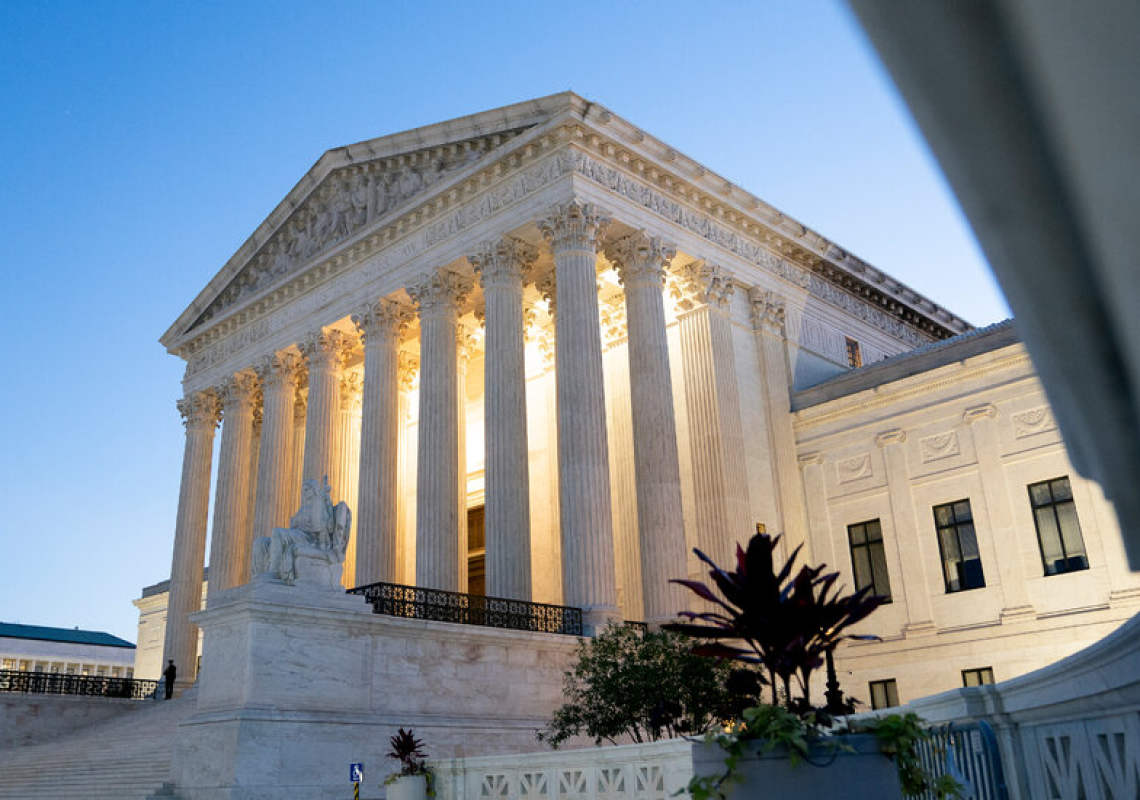Advertisement
Supported by
Saying the law is “plainly unconstitutional,” the department also asked the court to add the case to its docket in its current term.
Send any friend a story
As a subscriber, you have 10 gift articles to give each month. Anyone can read what you share.
By Adam Liptak
WASHINGTON — In a forceful brief filed Monday, the Biden administration urged the Supreme Court to temporarily block a Texas law that bans most abortions in the state while a legal challenge moves forward, calling the law “plainly unconstitutional.”
Leaving the law in effect, the brief said, would allow Texas to flout half a century of Supreme Court precedents that forbid states from banning abortions before fetal viability, or about 22 to 24 weeks into a pregnancy. The challenged law, called Senate Bill 8, has been in force since the beginning of September and effectively bars abortions after around six weeks of pregnancy.
“It virtually eliminated access to abortion in Texas after six weeks of pregnancy,” the brief said. “Texas has, in short, successfully nullified this court’s decisions within its borders.”
The court signaled that it may act quickly. Justice Samuel A. Alito Jr., who oversees the federal appeals court responsible for Texas, asked officials there to file their response to the Justice Department’s application by Thursday at noon. The court could rule in the following days.
Saying the matter was urgent and important, the brief also asked the court to consider adding the question of the law’s constitutionality to the docket of cases it plans to hear this year, bypassing the appeals court, which is scheduled to hear arguments on it in December. The Supreme Court is already scheduled to hear another major abortion case, involving a Mississippi law, in December.
“S.B. 8 is an affront to the United States’ sovereign interests in maintaining the supremacy of federal law and ensuring that the traditional mechanisms of judicial review endorsed by Congress and this court remain available to challenge unconstitutional state laws,” the Justice Department brief said.
In a bitterly divided decision last month in a different case, one brought by abortion providers regarding the same law, the Supreme Court let the law go into effect, effectively ending access to abortion for most Texas women. The majority said there were procedural obstacles that counseled against granting the providers’ request to block the law.
Late last month, the providers asked the court to take another look at the case and to put their request on an unusually fast track. Late Monday afternoon, after having taken no action on the request for almost a month, the court ordered officials in Texas to respond to the providers’ motion by noon on Thursday, the same deadline it had set for a response to the Justice Department’s application.
The Justice Department, in a brief filed by Brian H. Fletcher, the acting solicitor general, said the two cases were different. The federal government has interests and powers different from those of private litigants, he wrote, adding that it is not required to overcome the procedural hurdles at issue in the earlier ruling.
The Texas law, which has no exception for pregnancies resulting from rape or incest, has an unusual feature that has complicated efforts to challenge it in court.
Instead of making state officials responsible for enforcing the law, the law allows private citizens to sue abortion providers and others who help women obtain the procedure. That help can include financial assistance or giving a woman a ride to a clinic.
The plaintiffs need not claim any connection to those they sue. If they prevail, the law entitles them to damages of at least $10,000, along with legal expenses. Abortion providers sued under the law must pay their own legal fees whether they win or lose.
The law’s drafters, Mr. Fletcher told the justices, “have candidly acknowledged that the law was designed to deter constitutionally protected abortions while evading judicial review.”
The law’s defenders say that providers can challenge the law by violating it, getting sued and asserting the law’s unconstitutionality as part of their defense.
“In theory, providers could perform prohibited abortions and then assert S.B. 8’s unconstitutionality as a defense in the resulting enforcement actions,” Mr. Fletcher wrote. “But that avenue of review is not even theoretically available to pregnant women — whose rights S.B. 8 directly violates — because they cannot be sued under the law. And Texas crafted S.B. 8 to ensure that the threat of crippling liability would deter providers from taking their chances in court.”
Mr. Fletcher urged the justices to look at the big picture.
“S.B. 8 is plainly unconstitutional under this court’s precedents,” he wrote. “Texas has not seriously argued otherwise.”
In response to an earlier request by the Justice Department, Judge Robert L. Pitman of the Federal District Court in Austin temporarily blocked the law earlier this month, writing that he would “not sanction one more day of this offensive deprivation of such an important right.”
Abortion at the Supreme Court. The justices’ upcoming ruling on a Mississippi law could dramatically change abortion access in the U.S., including possibly overturning the landmark Roe v. Wade decision, which established a constitutional right to abortion.
If Roe v. Wade is overturned. Abortion would remain legal in more than half of states, but not in a wide swath of the Midwest and the South. Legislatures in 22 states would almost certainly move to ban or substantially restrict access to abortion.
Who gets abortions in America? The portrait of abortion has changed with society. Today, teenagers are having far fewer abortions. The typical patient is most likely already a mother, poor, unmarried, in her late 20s, has some college education and is very early in pregnancy.
The politics are complicated. Americans are not as neatly divided on abortion as politicians and activists. Overall, 26 percent of voters hold a different view on abortion than the presidential candidate they supported in 2020, one poll found.
Abortion pills. The F.D.A. will permanently allow patients to receive abortion pills by mail, broadening access to medication abortion, but many conservative states are likely to mobilize against the decision. In 19 states, telemedicine visits for the pills are already banned.
He criticized the law’s efforts to avoid judicial scrutiny.
“Fully aware that depriving its citizens of this right by direct state action would be flagrantly unconstitutional,” Judge Pitman wrote, “the state contrived an unprecedented and transparent statutory scheme to do just that.”
Last week, a divided three-judge panel of the U.S. Court of Appeals for the Fifth Circuit, in New Orleans, stayed Judge Pitman’s ruling, reinstating the law. The application filed Monday asked the Supreme Court to lift the stay.
The majority opinion in last month’s 5-to-4 Supreme Court decision refusing to block the law was unsigned and consisted of a single long paragraph. It said the abortion providers who had challenged the law in an emergency application to the court had not made their case in the face of “complex and novel” procedural questions.
The majority stressed that it was not ruling on the constitutionality of the Texas law and did not mean to limit “procedurally proper challenges” to it.
“The court’s order is stunning,” Justice Sonia Sotomayor wrote in dissent. “Presented with an application to enjoin a flagrantly unconstitutional law engineered to prohibit women from exercising their constitutional rights and evade judicial scrutiny, a majority of justices have opted to bury their heads in the sand.”
In the new brief, Mr. Fletcher wrote that it would not be hard to envision other laws based on the Texas model.
“If Texas is right,” he wrote, “states are free to use similar schemes to nullify other precedents or suspend other constitutional rights. Our constitutional system does not permit states to so easily thwart the supremacy of federal law.”
“A state might, for example, ban the possession of handguns in the home or prohibit independent corporate campaign advertising and deputize its citizens to seek large bounties for each firearm or advertisement,” Mr. Fletcher wrote, noting that both laws would contravene Supreme Court precedents.
“The state’s ingenuity,” Mr. Fletcher wrote, “does not permit it to nullify constitutional rights in that manner.”
Advertisement






